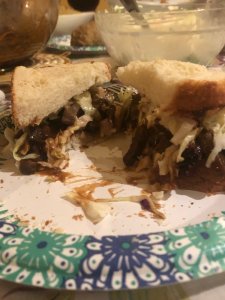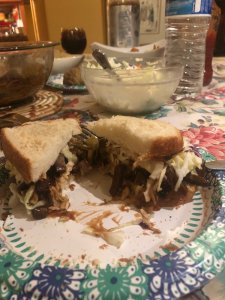I think you need to increase the temperature to 150f or so. I forgot the exact temperature at which collagen breaks down but isn't 140f the bare minimum at which it can?
These following paragraphs go along with Dave's SV thing from Baldwin above. Collagenase is an enzyme similar to post rigor enzymes like Calpains and Cathepsin that break down collagen into gelatin before heat denatures it into gelatin. Calpain enzymes deactivate at 104*F and Cathepsin at 122*F and collagenase at 140*F so the 135*F for 36-48 hours recipe for brisket Dave has above in his post keeps the collagenase enzyme action throughout the entire SV cook which I'll try sometime. The other two enzymes from a
thermoworks recipe work very quickly just under their deactivation temps compared to wet or dry aging in a fridge. Just fifteen minutes in the 90* range offers dual enzyme action which is also prime danger zone temps but has a drastic impact on tenderness. If I can soak a brisket flat at 90* for a half hour or a chuck roast, before bumping to 135* to soak for 30 hours and have the beef pasteurized within the first four hours, that may insure fork tenderness from the dual calpain/cathepsin action. It's figuring out how long it takes to ramp up SV bath temp from 90 to 131+ to pasteurize in a safe time period.
Tough Meat
Prolonged cooking (e.g., braising) has been used to make tough cuts of meat more palatable since ancient times. Indeed, prolonged cooking can more than double the tenderness of the meat by dissolving all the collagen into gelatin and reducing inter-fiber adhesion to essentially nothing (Davey et al., 1976). At 176°F (80°C), Davey et al. (1976) found that these effects occur within about 12–24 hours with tenderness increasing only slightly when cooked for 50 to 100 hours.
At lower temperatures (120°F/50°C to 150°F/ 65°C), Bouton and Harris (1981) found that tough cuts of beef (from animals 0–4 years old) were the most tender when cooked to between 131°F and 140°F (55°C and 60°C). Cooking the beef for 24 hours at these temperatures significantly increased its tenderness (with shear forces decreasing 26%–72% compared to 1 hour of cooking). This tenderizing is caused by weakening of connective tissue and proteolytic enzymes decreasing myofibrillar tensile strength. Indeed, collagen begins to dissolve into gelatin above 122°F to 131°F (50°C to 55°C) (Neklyudov, 2003; This, 2006). Moreover, the sarcoplasmic protein enzyme collagenase remains active below 140°F (60°C) and can significantly tenderize the meat if held for more than 6 hours (Tornberg, 2005). This is why beef chuck roast cooked in a 131°F–140°F (55°C–60°C) water bath for 24–48 hours has the texture of filet mignon.





